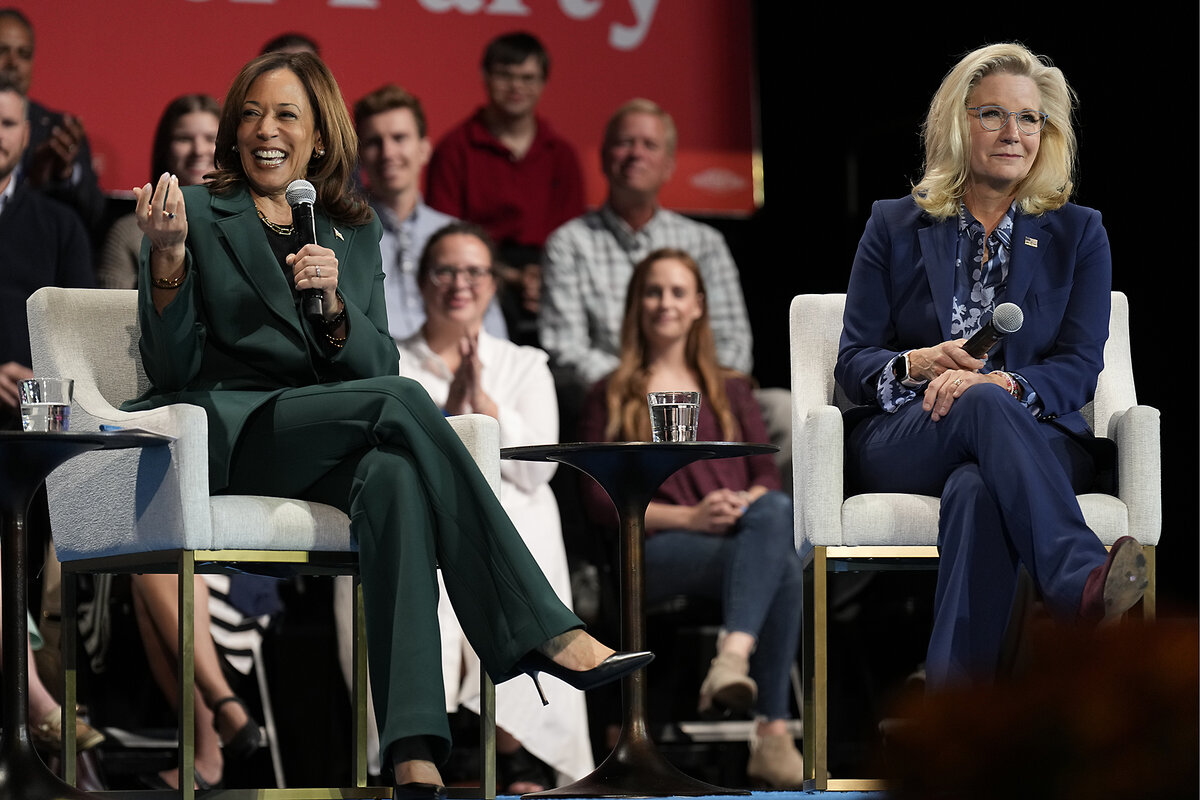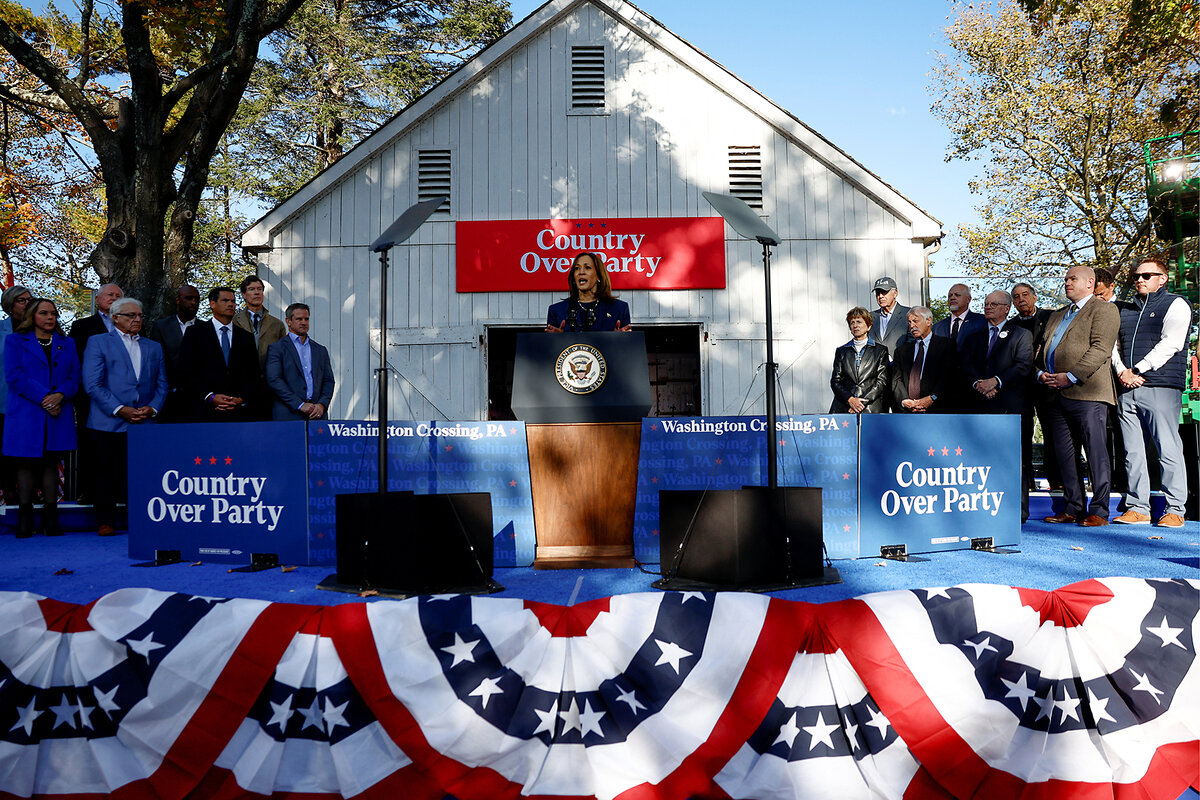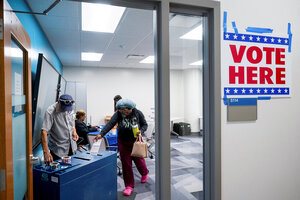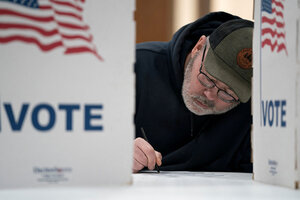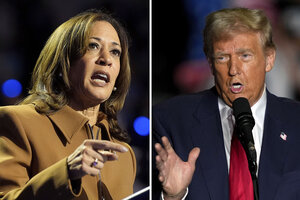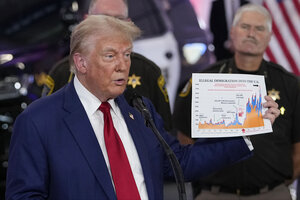Meet the ‘Haley Voters for Harris’ who could tip the election
Loading...
| Washington Crossing, Pa.
Across the United States, more than 4 million people voted for former South Carolina Gov. Nikki Haley in the Republican primaries. Now, in a neck and neck presidential race, Vice President Kamala Harris is making a play for those very voters.
Instead of coalescing behind former President Donald Trump as the presumptive nominee, a notable share of Republican voters cast their primary ballots for Ms. Haley, even after she’d long suspended her campaign – in some states amounting to double-digit support.
Mr. Trump has appeared unconcerned about winning that voting bloc, which could be the difference-maker in several swing states. Last week on “Fox & Friends,” the former president dismissed a question about Haley supporters who remain reluctant to give him their support. “I beat Nikki Haley. I beat everyone else, too – badly,” Mr. Trump said. “Nikki is helping us already.”
Why We Wrote This
Primary candidates and their supporters typically line up behind their party nominee. This year, Nikki Haley endorsed former President Donald Trump, but not all her supporters are on board. Their votes could sway a tight election.
Ms. Haley endorsed Mr. Trump in July and has said she would campaign for him if asked. “He’s aware that I’m ready if he ever needs me to do that,” she said last month on CBS’ “Face the Nation.” But she has yet to appear on the campaign trail for Mr. Trump, though there have been reports that his campaign is in talks to arrange an appearance with the former governor.
Polls show Mr. Trump is viewed unfavorably by a majority of Haley supporters, as is Ms. Harris – though she’s viewed more favorably than both Mr. Trump and President Joe Biden by these voters. An Oct. 9 survey found that 36% of voters around the country who supported Ms. Haley in the Republican primary say they’ll vote for Ms. Harris in the upcoming election. The poll by Blueprint, a Democratic research group, only included registered Republicans and independents. Among the Republican Haley supporters, 49% planned to vote for Mr. Trump, even though 64% of them said they had voted for him in 2020. Among independents, 38% said they would support Mr. Trump, down from 48% who’d backed him in 2020.
The Harris campaign, aided by anti-Trump Republican groups, is zeroing in on Haley supporters who may yet be undecided, in an election where the outcome could be determined by just tens of thousands of votes in a handful of states.
“Nikki Haley voters will show up to the polls,” but it’s a “toss-up” who they’ll vote for, says Dave Wilson, a South Carolina GOP strategist. “Donald Trump needs to bring every voter who might be on the fence across the fence, if he wants to win.”
“This election comes down to character”
Haley Voters for Harris, a super PAC unaffiliated with Ms. Haley, placed a seven-figure ad buy across swing states including Pennsylvania aimed directly at Haley supporters, who the group says are “independent-minded” voters.
“On the issues that are really most key to our voters, [Ms. Harris] has positioned herself as someone who will govern from the center,” says Craig Snyder, national and Pennsylvania director for Haley Voters for Harris.
The group is not just trying to get Haley supporters on board with Ms. Harris’ policies, says Craig Peterson, who oversees its Wisconsin efforts – though he says Ms. Harris’ policy positions come closer to those of President Ronald Reagan than do Mr. Trump’s. Rather, the goal is to assure Haley supporters that they can vote for Ms. Harris without forfeiting their identities as Republicans.
Mr. Peterson says there are 110,000 “double haters” – people who voted for Ms. Haley or former New Jersey Gov. Chris Christie and don’t like either of the two nominees – in Wisconsin. His group’s approach in that state, where the race could be as close as 20,000 votes, is “laser-guided,” he says, with TV ads aimed directly at those voters, many of whom are suburban women.
Matthew McCaffery, a lifelong Republican from Pennsylvania, supported Ms. Haley in the primary. Back in 2016, wanting a change in the political status quo, he’d backed Mr. Trump. But soon after, Mr. McCaffery began feeling as though the man he’d voted for couldn’t do the job.
By the time Gen. James Mattis called Mr. Trump unfit to serve, Mr. McCaffery – a Marine Corps veteran who had served in Iraq under Mr. Mattis – had decided to vote for Mr. Biden in 2020.
This year, he’s voting for Ms. Harris.
“This election comes down to character, behavior, and just who can be a steady hand at the wheel,” says Mr. McCaffery. “Though I may not agree with a lot of what the vice president believes in, I know that she’ll be a capable leader.”
In Pennsylvania, 16% of Republicans voted for Ms. Haley in the primary, even though she’d dropped out of the race seven weeks earlier. Ms. Harris and Mr. Trump are now in a tight race in the state, and Democrats believe many of the 160,000 or so Haley supporters may be persuadable.
“Given that Pennsylvania is likely to be one of the more pivotal states and given that it could be close, anything could end up making a difference,” says Anthony Fowler, a professor at the University of Chicago. “I think it does make sense to go for people in the middle.”
A flurry of events with anti-Trump Republicans
Ms. Harris has been campaigning with former GOP Rep. Liz Cheney and other anti-Trump Republicans, holding a series of events in battleground states designed to appeal to disillusioned Republican voters.
“The coalition we have built has room for everyone who is ready to turn the page on the chaos and instability of Donald Trump. And I pledge to you to be a president for all Americans,” Ms. Harris said at an event in Pennsylvania last week, where she stood in front of a white barn decorated with a “Country Over Party” sign, on the banks of the Delaware River near where George Washington crossed on Christmas night in 1776.
Former Republican officials including U.S. Reps. Jim Greenwood and Adam Kinzinger, and Trump administration official Olivia Troye also spoke to the invite-only crowd of about 500. Others, including former Rep. Barbara Comstock, joined on the dais. After, Ms. Harris sat for an interview with Fox News’ Bret Baier.
Ms. Harris has won other recent endorsements from Republicans, including in a letter signed by 20 GOP leaders and voters from Wisconsin, from former Haley campaign staff in Michigan, and from former Arizona Sen. Jeff Flake. Ms. Cheney’s father, former Vice President Dick Cheney, has also endorsed the Democratic nominee.
The event in pivotal Bucks County, Pennsylvania, shows that the Harris campaign is serious about welcoming GOP voters uneasy with Mr. Trump, says Mr. Greenwood, a six-term former member of Congress from the area.
“[It signals] that they’re seeking Republican support, and that they have Republican support, and that they want more Republican support,” says Mr. Greenwood, a co-chair of Republicans for Harris.
Mr. McCaffery, the former Marine, says he knows other Republican voters who plan to break with their party this election. Many just aren’t publicizing it, he says. “They’re definitely more quiet,” an approach he recommends after experiencing a swatting call, receiving hostile mail and online comments, and being ousted from his position as a local GOP leader since speaking publicly about his disapproval of Mr. Trump.
Pro-Harris Republican groups bet that if the Harris campaign can sway even a third of undecided Haley supporters in key swing states, that could bring Ms. Harris a winning margin.
But for some, dislike of both candidates is so strong they can’t see themselves voting for either one. Speaking by phone as she delivered ballots to a Philadelphia-area nursing home, Kim Decker, a Harris campaign “super volunteer,” says she often meets undecided voters as she canvasses near her home north of the city. Many of them may wind up filling out the rest of the ballot but not casting a vote for president, she says. “They’re completely decided that they’re not voting for Trump or for Kamala.”
There’s an answer for those Republicans who feel torn between their Republican values and their dislike of Mr. Trump, says Mr. Greenwood, the former congressman. “There will be lots of Republicans in Congress,” he says. “It’s not like there’s going to be some left-wing agenda moving through Congress.”







